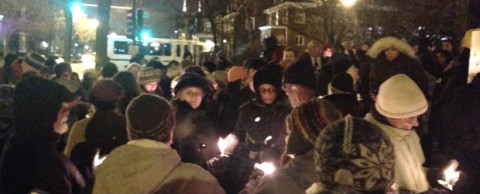What "we" shall overcome?

Last night I stood at a vigil proclaiming “Black lives matter.” Ours was an interfaith and intergenerational crowd, but we sang the gospel protest songs of generations past. I stumbled when we got to “We Shall Overcome.”
I stumbled for a couple reasons. First, the song makes me cry, cry, cry. I weep that there remains cause to sing it. But I also stumbled because I have remarkably little, personally, to overcome in my life. I wondered if it was fitting, in all my abundant white, educated, and employed privilege, to sing, to claim to be a part of the “we.”
The “we” is important. As a preacher, I use it all the time. In interfaith groups, I am increasingly aware of what I claim for “all of us in attendance here.” As Americans talk about race, it’s important to note who is included in the “we” and what experiences we share, and don’t. For one thing, I’ve never been harassed by police.




